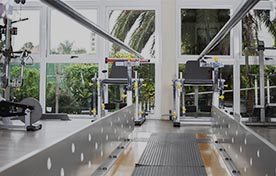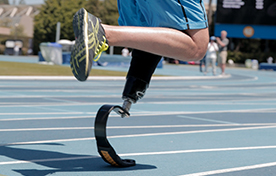How Peer Visitation Can Help the Journey to Emotional Recovery
“Everybody has their different journey, which I’ve learned from speaking with my prosthetist and counselor. They say you have to mourn your leg, but I also have to mourn my life. I won’t ever have that life with the same level of activity again.”
Laura Nugent was on her way across country by motorcycle in August 2007 when she was hit by a car on the highway and became an amputee. Her left leg was amputated right away. Her right leg was also planned for amputation, but the night before the operation, the surgeon said he’d found someone who could save it. So, through a process called limb lengthening, Laura actually grew 8 centimeters of bone over the course of 2 years. “The right leg is a miracle, but that is what hindered my recovery,” she says. “If they had amputated it, I would have been up and walking around much more quickly.” Despite the long recovery time and the fact that she is in pain every day, Laura has no regrets about the procedure or the decision to keep her right leg.
“Before the accident, I was a runner and a ballroom dancer, and I worked and rode my motorcycle. I had a wonderful life,” she says. “I always say it was the best day of my life when I was on a new motorcycle, and I was going to go across the country for 3 weeks. All of a sudden, boom, and your life changes.”
Since then, Laura has struggled with pain – physical and emotional. She grew tired of people telling her to move on. “You can’t force it,” she says. “People would tell me ‘You should do this,’ ‘You should do that.’ I’m like, ‘Leave me alone,’ and then, all of a sudden, one day I do it.”
Laura, who has been in therapy since her accident, has learned that everyone’s pace of recovery is different. She can’t simply “move on” just because other people think it’s time for her. On the other hand, she’s not sitting around feeling sorry for herself, and she’s the first to acknowledge that she has had a tremendous outpouring of support from friends and family, which has helped her get where she is today.
“Everybody has their different journey, which I’ve learned from speaking with my prosthetist and counselor,” she says. “They say you have to mourn your leg, but I also have to mourn my life. I won’t ever have that life with the same level of activity again.”
Although the limb lengthening meant she spent much of the last 2 years in a wheelchair, Laura is grateful for her leg. “My family made the decision to save my leg because I was out of it after the trauma and very sedated. Sometimes with the pain, they weren’t sure if they made a good decision, but I’m so glad they did,” she says. “I feel like I can be attached to the ground through it. I can feel the grass or the water. I feel like without it, I would never be grounded to the earth.”
Laura remembers when she was in the hospital and knows that a peer visitation would have helped her. When Laura returned home and news of her amputation spread through the community, Shari Caradonna, an Amputee Coalition-certified peer visitor, learned about Laura’s story, but she didn’t have a way of getting in touch. For several months, Shari, who also had a traumatic lower-extremity amputation, tried to find a direct contact who could ask Laura if she would like to meet with her.
Finally, Shari was able to get confirmation that Laura wanted to meet her. Although the meeting was by chance and not an official peer visit, it became an important meeting for both women. Shari has dedicated much of her post-amputation life to reaching out to amputees, and she was thrilled to be able to help Laura. Shari saw that Laura was not as mobile as she could be because she had to wait for insurance to approve her prosthesis before going to the prosthetist she had found. Shari recommended that Laura go to her prosthetist instead so she could get a leg right away despite insurance obstacles. Laura gets teary thinking of how much her friend has helped her through her ordeal, and her outlook now owes a great deal to this friendship.
“I have the faith that I’ll be OK,” she says. “I’m not going to be able to run or dance. But I always say I know that I’ll be OK. But if I don’t get up and put my leg on every day and walk, I’m never going to be OK. I’ve got to get up every day, put that leg on, no matter how much it hurts, and walk. It’s almost like a physical representation of what happens emotionally.”
Now that Laura is more mobile, she wants to be an advocate for others. “As someone who has spent a lot of time in a wheelchair, being an advocate for people in wheelchairs is something very important to me,” she says. She also plans to become an Amputee Coalition-certified peer visitor. “I think helping others is one of the greatest things. It’s natural to want to give back, too, considering how much help I’ve received.”
Laura’s experience mirrors what we already know about emotional recovery from limb loss. Amputees may face social and physical challenges, pain, changes to body image or financial burdens – all of which can impact one’s emotional state.
Findings from the Amputee Coalition’s Limb Loss Research and Statistics Program indicate that:
- Almost 30 percent of people with limb loss had a depressed mood.
- Depressive symptoms in people with limb loss are 2-4 times greater than in the general population.
- Almost half reported significant anxiety or depression 3-24 months after a lower-extremity amputation.
Laura knows that she would have had a better start toward emotional recovery with peer visitation because no one other than an amputee can fully understand what it’s like to lose a limb. The Amputee Coalition’s peer support program promotes recovery in ways that healthcare professionals cannot address. There is no substitute for peer support in demonstrating genuine understanding, providing information at an appropriate pace and offering encouragement based on firsthand experience. Through peer support, the person with limb loss learns:
- That others experience similar feelings of loss and grief
- What it’s like to perform daily activities
- What problems might arise and how others have dealt with similar issues
- Techniques for returning to work, school and daily activities
- Where to find national and local resources
- Strategies for dealing with changes in personal relationships.
If you or someone you know might benefit from peer support or would like to become a certified peer visitor, please contact the Amputee Coalition at 888/267-5669 or visit amputee-coalition.org.
Disclaimer: The following information is provided and owned by the Amputation Coalition of America and was previously published on the website http://www.amputee-coalition.org or the Coalitions Newsletter, inMotion.








